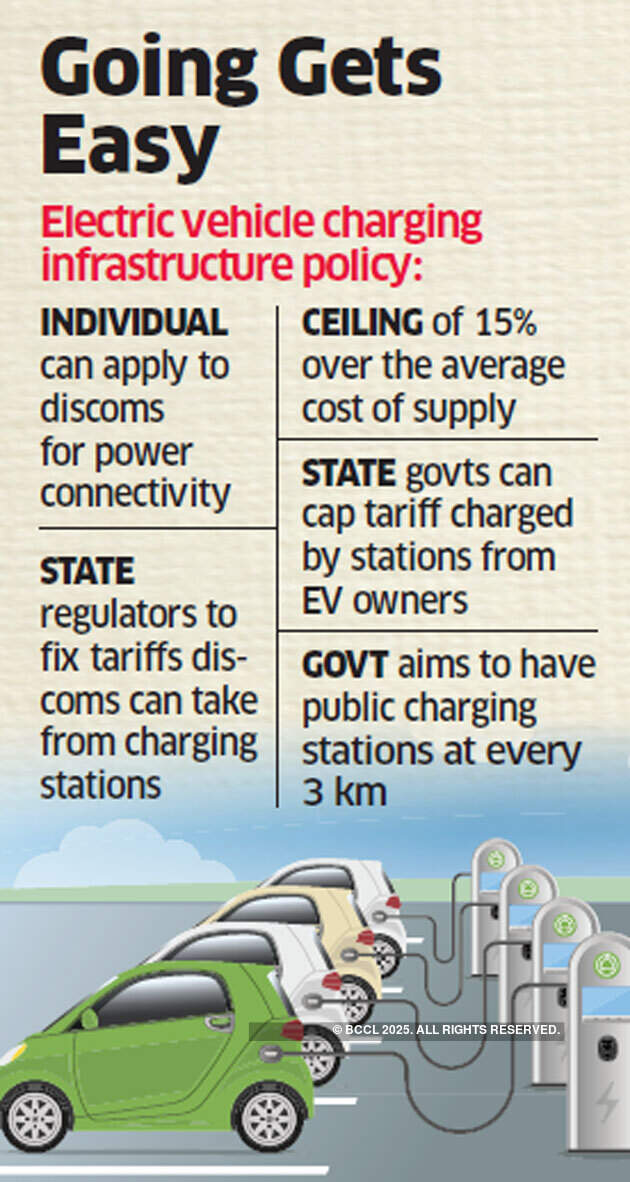De licensing Charging stations for EV
The latest news is that individuals can set up EV charging stations and no license is required. This is from the ET Energy News. Click the figure to see enlarged figure.
What is not clear is how one is going to figure out the business potential. Though it is not a matter of concern for the government it does not give any direction to the overall concept to move ahead. It needs volume of vehicles to seek the charging stations. Why anyone would come forward to put up a charging station where electric vehicles are not around ?
In essence it allows the grid power to be tapped for charging with a tariff cap of 15% over the average cost of supply. This opens up lot of questions. Assume average cost of power is Rs 7 per kwh. 15% is Rs 1.05 ie the charging station can charge the EV owner at the rate of Rs 8.05 /kwh if my understanding is right.
 I expect the possibility of more electric scooters than electric cars in the near future which may stand to benefit from this scheme and hence restrict this discussion for two wheeler charging needs.
I expect the possibility of more electric scooters than electric cars in the near future which may stand to benefit from this scheme and hence restrict this discussion for two wheeler charging needs.
A two wheeler even after 6 to 8 hours of charging consumes only 1 to 1.2 kwh as battery size is between 21 Ah to 33 Ah with a charging current of 1.2 Amps.
In other words even after allowing for 6 hours a person earns only Rs 8 per terminal !! Is there any attraction in terms of revenue ?
A seeker of alm outside any big temple or Church would earn more than that in that period !! ( just in a lighter vein)
What is the cost of installing a charging station and the return on investment (ROI) apart from the investor's margin ? These questions certainly does not get any answer with this kind of press release or reporting.
Best way is to insist on solar based charging stations as a stand alone ( with a back up from power grid for nights) and use net metering for connecting to the grid.
Thus even when there are no vehicles to charge, the generated power gets exported to the grid and gets some income for investment for the entrepreneur. Here charging station with two or three terminal is just an add-on to the solar power generation unit from investment point of view. This will also help to identify the Charging stations dedicated for the specific purpose of EV charging.
The revenue model for such stations is already discussed in the embedded slide share in my previous post.
What is not clear is how one is going to figure out the business potential. Though it is not a matter of concern for the government it does not give any direction to the overall concept to move ahead. It needs volume of vehicles to seek the charging stations. Why anyone would come forward to put up a charging station where electric vehicles are not around ?
In essence it allows the grid power to be tapped for charging with a tariff cap of 15% over the average cost of supply. This opens up lot of questions. Assume average cost of power is Rs 7 per kwh. 15% is Rs 1.05 ie the charging station can charge the EV owner at the rate of Rs 8.05 /kwh if my understanding is right.
 I expect the possibility of more electric scooters than electric cars in the near future which may stand to benefit from this scheme and hence restrict this discussion for two wheeler charging needs.
I expect the possibility of more electric scooters than electric cars in the near future which may stand to benefit from this scheme and hence restrict this discussion for two wheeler charging needs.A two wheeler even after 6 to 8 hours of charging consumes only 1 to 1.2 kwh as battery size is between 21 Ah to 33 Ah with a charging current of 1.2 Amps.
In other words even after allowing for 6 hours a person earns only Rs 8 per terminal !! Is there any attraction in terms of revenue ?
A seeker of alm outside any big temple or Church would earn more than that in that period !! ( just in a lighter vein)
What is the cost of installing a charging station and the return on investment (ROI) apart from the investor's margin ? These questions certainly does not get any answer with this kind of press release or reporting.
Best way is to insist on solar based charging stations as a stand alone ( with a back up from power grid for nights) and use net metering for connecting to the grid.
Thus even when there are no vehicles to charge, the generated power gets exported to the grid and gets some income for investment for the entrepreneur. Here charging station with two or three terminal is just an add-on to the solar power generation unit from investment point of view. This will also help to identify the Charging stations dedicated for the specific purpose of EV charging.
The revenue model for such stations is already discussed in the embedded slide share in my previous post.








0 comments:
Post a Comment